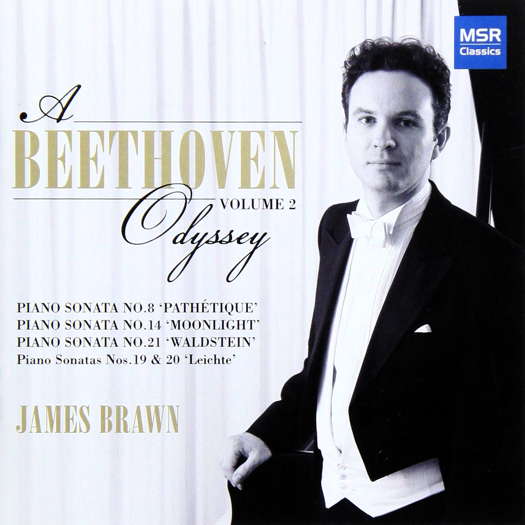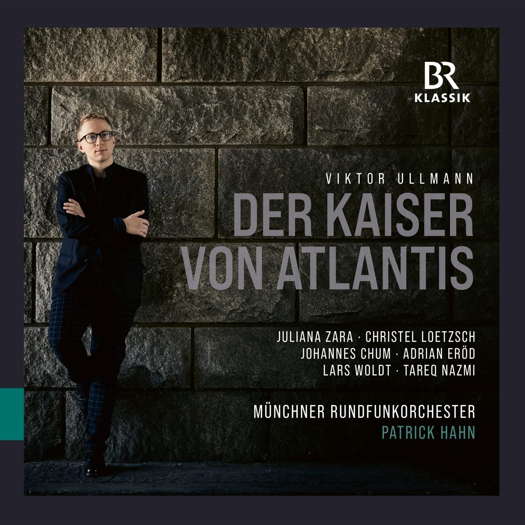 SPONSORED: CD Spotlight. Perfect Indeed - More Beethoven from James Brawn, recommended by Andrew Schartmann.
SPONSORED: CD Spotlight. Perfect Indeed - More Beethoven from James Brawn, recommended by Andrew Schartmann.
All sponsored features >>
ARTICLES BEING VIEWED NOW:
- Régine Crespin
- Hector Berlioz
- Ruth Railton
- Marián Varga
- Profile. A Very Positive Conductor - Paul Bodine talks to Los Angeles Opera's Music Director Designate, Domingo Hindoyan
- Cilea
- Oliver Rudland
- Ahmed Adnan Saygun
- Alexander Skryabin
- Rebecca Clarke
- The New Statesman
- Justin Connolly: Ceilidh
- Paul Wittgenstein

A Monumental Work
GEOFF PEARCE is impressed by Viktor Ullmann's opera 'Der Kaiser von Atlantis'
'The performance ... cannot be faulted ...'
This fascinating drama composed by Viktor Ullmann (1898-1944) was written in collaboration with librettist Peter Kien when they were both interred in Theresienstadt concentration camp. The work was refused permission to be performed in 1944 after its dress rehearsal. Ullmann and Kien were soon after sent to Auschwitz where they both perished.
The work starts with a prologue, in which the powerful voice of Lars Woldt introduces the work with 'Hallo, Hallo ...' to get everyone's attention he introduces background and main characters, and this is accompanied with prominent parts for drum and trumpet to give the impression of an army.
Listen — Ullmann: Prolog (Der Kaiser von Atlantis)
(900339 track 1, 0:00-0:45) ℗ 2022 BRmedia Service GmbH :
This is followed by a rather jaunty but strangely dislocated preludium, followed by a song by the Harlequin, an old man sitting on park bench, singing to the moon which has taken wine and women with it. Death is sitting beside him. This is followed by a duet recitative in which Harlequin, disillusioned with life, implores Death to kill him. Death says that no man can escape himself. At this point Harlequin becomes maudlin and self pitying, but he does not receive any solace from death.
Death laments that he is only seen as a minor craftsman now, where before, people would dress in splendid robes to greet him, so when the Emperor decrees a battle in which everyone must take part, Death breaks his sword and refuses to cooperate.
Listen — Ullmann: Arie des Todes (Der Kaiser von Atlantis Scene 1)
(900339 track 9, 0:00-0:32) ℗ 2022 BRmedia Service GmbH :
The Second Scene begins an announcement then an intermezzo called a Dance of Death. This is followed by a strange movement in which Kaiser Overall's announcements are interspersed with military reports and also reports that a man could not die by executions, nor could sick people succumb to disease. This track is about five minutes long and is the second most extended of the tracks which generally last less than two minutes.
Listen — Ullmann: Wie spät ist es? (Der Kaiser von Atlantis Scene 2)
(900339 track 13, 3:00-3:51) ℗ 2022 BRmedia Service GmbH :
This is followed by an aria by the Kaiser who gives his version of the truth which is that he has given is soldiers an everlasting life potion, and he can give it to anyone he wants to. This followed by another brief dance of death.
The third scene is on the battlefield, and consists of a soldier, the drummer and a young woman who is the fleeting love interest of the soldier, whilst the drummer believes he can summon anyone to fight with his instrument. The young woman believes there is a whole world out there apart from the war, and convinces the soldier that love prevails.
Listen — Ullmann: Wer da? (Der Kaiser von Atlantis Scene 3)
(900339 track 16, 0:39-1:26) ℗ 2022 BRmedia Service GmbH :
The final scene begins with a spoken commentary that outlines the final scene. Then follows a recitative, in which there is a report of riots and defections. In the next track, the harlequin contrasts his happy childhood with the horrors unfolding under the reign of Kaiser Overall.
The Kaiser surveys his machines of destruction and death, wonders if he is God's calculating machine, or is even human. A dance follows there Harlequin and the young woman and the Kaiser himself all comment on that question. Eventually he rips a veil from a mirror and beholds Death, who proclaims himself as the bringer of redemption and freedom, and how the war is over.
Whilst the Kaiser does not believe that this is the end of war and suffering, he nevertheless accompanies Death through the mirror. This is the longest and most poignant of all the tracks: the Kaiser's musings on the future of mankind before he accompanies Death.
Listen — Ullmann: Des Kaisers Abschied (Der Kaiser von Atlantis Scene 4)
(900339 track 27, 2:24-3:15) ℗ 2022 BRmedia Service GmbH :
The final track in which those that remain sing a chorale as a homage to Death as the reliever of all suffering is a rather unworldly setting of the Luther chorale Ein Feste Burg and is a fitting end to this remarkable work.
I believe that this is a monumental work. Apart from being produced in the horrors of a concentration camp, it is very symbolic and there are many references reflecting the times. The comprehensive programme booklet outlines many of these. Ullmann was a student of Schoenberg and Alois Hába, but there are so many styles and musical references in this work, yet at the same time, there is a cohesion and sense to it that simply makes it a delight to listen to. The performance, whether it be singers, narrator or orchestra, cannot be faulted, and there are a few instances where you will hear some of the nicest oboe playing I have ever heard. This is a work that must be heard, and thank goodness, in recent years there has been considerable interest.
Copyright © 6 June 2022
Geoff Pearce,
Sydney, Australia

CD INFORMATION: DER KAISER VON ATLANTIS


